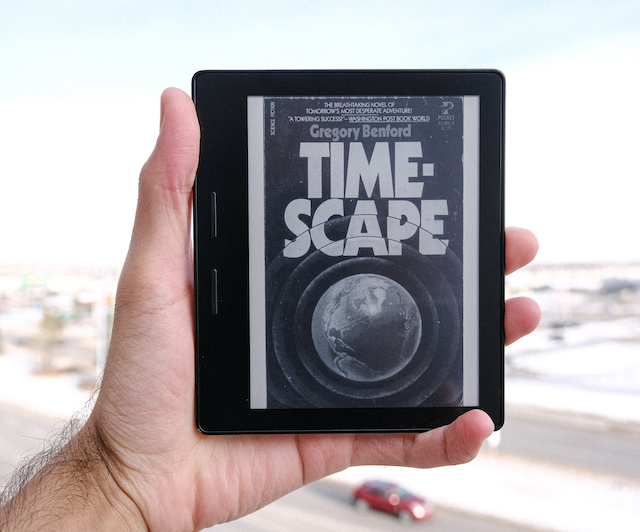Dec 18, 2020 - 4 minutes
📖 Timescape by Gregory Benford

Rating: 🌕🌕🌑🌑🌑
The sexism is strong with this one, and so is the casual racism. “You can’t judge an old book by the standards of today”, and I agree. If you enjoy reading books from years past like I do, you know that they’re often accompanied by a heavy load of outdated ideas, stereotypes, and social norms. Science fiction is not immune to that, even though you can often find highly progressive and forward-thinking books in the genre that were written at a time where such ideas were inexistent.
Having to imagine a different world means you get a license (and are often expected) to rewrite the rules, include those that define the culture of your time. I don’t hold writers to this standard, and I don’t hold Mr Gregory Benford here to that, either. This book was published in 1980, however, and that is shocking. Had it been published 50 years earlier, I could perhaps understand the unnecessary racist remarks or the proud portrayal of women throughout the book as being of no more use than to please husbands or satisfy the sexual desires of men who cross their paths. It wasn’t just the characters who behaved this way, it was the narrator, too.
This is a time travel story, and with every story of the kind, you have the opportunity to build more than one world, and to convey progress. Benford went back and forth between 1963 and 1998 (the two main points of time in his book), which was nice. Somehow he managed to teleport, intact, the cultural norms of his 1963 into 1998. Everything else changed, except the culture of the people. That, to me, is shortsighted and unimaginative. How this won so many awards is beyond me.
I had hopes, still, that the plot would be great. It had some promise, and that I will admit. The concept is excellent, and the build up was exciting. The ending, however, was a letdown. I think Benford took the easy way out with this one (I’d say that, though, wouldn’t I? After everything else I said up there!) Having read many time travel stories, this one felt like it was on a trajectory for greatness. I’d like to say that it crashed and burned in spectacular fashion, but even that it didn’t. It just wilted, deflated, and died.
Tidbits, for without these, I am nothing:
“When did you start feeling so inadequate?” “At ten."
“When is ‘now’? Saying that ‘now’ is ‘this instant’ is going around in circles. Every instant is ‘now’ when it `happens.’ The point is, how do you measure the rate of moving from one instant to the next? And the answer is, you can’t. What’s the rate of the passage of time?" Well, it’s”—Peterson stopped, thinking. “How can time move? The rate is one second of movement per second! There’s no conceivable coordinate systern in physics from which we can measure time passing. So there isn’t any. Time is frozen, as far as the universe is concerned."
People stressed differences, in order to keep alive their sense of self-worth. Us against Them stirred the blood. Better to play that distracting, antique game than to face the gray grip of closing future.
Inside, a jumble of terms elbowed each other for room in sentences that led nowhere. Equations appeared by sleight of hand, festooned with new symbols like fresh Christmas tree decorations. The theories, when Gordon took the time to listen, would begin and end in midair; they had no connection with anything else known in physics, and always violated the first rule of a scientific model: they were uncheckable. Most of the cranks seemed to think constructing a new theory involved only the invention of new terms. Along with “energy,” “field,” “neutrino,” and other common terms would appear “macron,” “superon,” and “fluxforce”–all undefined, all surrounded with the magic aura of the Believer.
“There’s only one electron in the universe, see. An electron traveling backwards in time looks like it’s antiparticle, the positron. So you bounce one electron back and forth through time. Make everything out of that one particle; dogs and dinosaurs, stones and stars."
Hi there! 👋 Want to be informed of new posts via email?